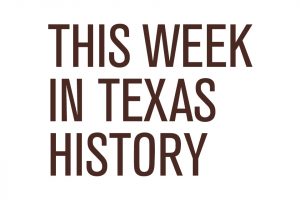The first-ever Texas Relays, a co-creation of University of Texas track coach Clyde Littlefield and athletic director Theo Bellmont, were held in Austin on Mar. 27, 1925.
In the history of college athletics, rarely have iconic stars returned to their alma mater to put their larger-than-life reputations on the line as coaches. An extraordinary exception to that rule was a do-it-all Yankee, who dedicated his life to sports at the University of Texas.
Clyde Littlefield was 12 years old in 1904, when his widowed father brought him from aptly named Oil City, Pennsylvania to Spindletop, birthplace of the Texas oil boom. The boy attended public schools in Beaumont and two private academies, where he got his initial taste of athletic competition, before enrolling in UT in the fall of 1912.
In four hectic years, Littlefield earned a dozen letters in three different sports – football, basketball and track. And he would have added three more to his collection had there been a way to squeeze baseball into his busy schedule.
What was Littlefield’s best sport? A strong case can be made for each, but here is his record.
Littlefield played quarterback and, when called upon, other positions as well on the Longhorn football team. He went “both ways,” meaning he played defense as well as offense which was the norm in college football until the 1950s.
How good was he on the gridiron? Well, he is considered a pioneer in the art of passing the pigskin, which was shaped like a watermelon in those days and not designed to be thrown. Two out of three varsity seasons he was an All-Southwest Conference performer, and perhaps most importantly he was a member of the legendary 1914 eleven that mopped the field with every foe.
A century later, fond memories of that first undefeated team still makes old UT alums misty-eyed. The ’Horns outscored eight opponents 358 to 21, and the closest anyone came to beating them was Haskell, an Indian school in Kansas that lost to the Austin juggernaut by 16 points. The 121 points tallied by Len Barrell stood as Texas’ single season record for 83 years until finally broken by Heisman Trophy winner Ricky Williams.
But if success is measured by W’s and L’s, the three basketball teams Littlefield played on were undeniably better. Not once did he end up on the losing side during his varsity career, as he twice led the indoor ’Horns in scoring and even rated All-American mention the season he was high-point man in the SWC.
As for track, Littlefield was no slouch on the cinders either. The hurdles were his specialty. He was unbeaten in the highs and tied the collegiate world record for that event. The speedster was almost as dominating in the lows losing a grand total of one race.
Littlefield did show what he might have accomplished on the baseball diamond if not for track meets and spring football practice. He pitched twice and won both games.
With diploma in hand and the cheers still ringing in his ears, Littlefield decided coaching gave him the opportunity to stay active in sports while keeping a roof over his head and food on the table. He accepted an offer from the high school in Greenville to coach football, basketball and track in addition to teaching a full load in the classroom.
Right out of the gate, Littlefield guided the track team to a state championship. In football he did even better winning every game save one over three years. In 1919, his last season in Greenville, the Lions did not allow a single opponent to score.
That December Littlefield went off to war but got no closer to the bloodbath in Europe than Arkansas. Discharged the next November, he no sooner had changed into civilian clothes than he learned a job was waiting for him at The University.
Littlefield started out as head track coach and the freshman coach for football and basketball. In 1927 he was put in charge of the pigskin program. On his seven-season watch, the Longhorns won two Southwest Conference titles outright and compiled an overall record of 44 wins, 18 losses and six ties.
In 1934 Littlefield returned full-time to his first love – track. He would remain at his post until forced into mandatory retirement in 1961. In 39 of his 41 seasons, the UT track team finished first or second in the Southwest Conference. He groomed a fistful of NCAA champions and four Olympians.
The Texas Relays that he and his AD launched in 1925 as a warm weather alternative to the Kansas Relays developed into one of track’s elite events. It was only fitting that he lived long enough to see it renamed in his honor.
Of the many tributes bestowed upon him before his death in 1981, Littlefield may have treasured the most the Apr. 4, 1963 “Honor Day” declared by Gov. John Connally. Teammates, former athletes and a who’s-who of coaches attended the celebration at the Driskill Hotel in downtown Austin.
To a man each and everyone knew Clyde Littlefield deserved to be remembered for much more than the Texas Relays.
Bartee welcomes your comments and questions at barteehaile@gmail.com or P.O. Box 152, Friendswood, TX 77549 and invites you to visit his web site at barteehaile.com.






